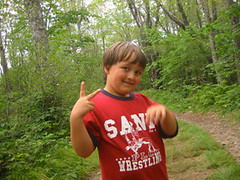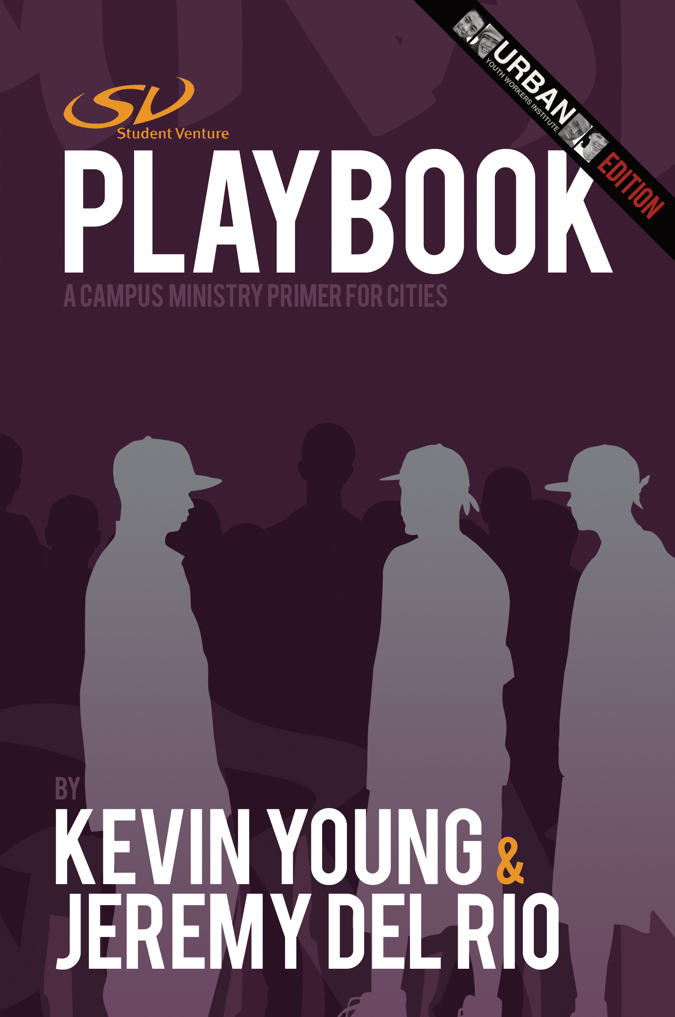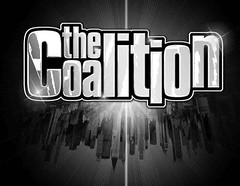« “God is in the slums, where the poor play house” | Home | Wednesday’s Weekly Webcast »
Justice: So easy a 5-year-old can do it
By Jeremy | March 6, 2007
 Who doesn't appreciate Geico's cavemen commercials? Provided they don't get overexposed (a very real possibility given the pilot t.v. episode they're supposedly filming) they could become an advertising institution.
Inspired by the cavemen and at the risk of offending my son Judah when he gets older, please indulge me for a second. Justice is so easy even a 5-year-old can do it.
It took me a while to figure that out. About six months actually, beginning roughly last March when I was asked to sit on a social justice panel at last year's Urban Youth Workers Institute (audio: Part 1 / Part 2). Michael Mata of Claremont University facilitated the conversation and a Claremont graduate student, Shane Claiborne, and I were panelists. In advance, Michael emailed some of the themes he hoped to address, the first being a question asking us to define social justice.
Who doesn't appreciate Geico's cavemen commercials? Provided they don't get overexposed (a very real possibility given the pilot t.v. episode they're supposedly filming) they could become an advertising institution.
Inspired by the cavemen and at the risk of offending my son Judah when he gets older, please indulge me for a second. Justice is so easy even a 5-year-old can do it.
It took me a while to figure that out. About six months actually, beginning roughly last March when I was asked to sit on a social justice panel at last year's Urban Youth Workers Institute (audio: Part 1 / Part 2). Michael Mata of Claremont University facilitated the conversation and a Claremont graduate student, Shane Claiborne, and I were panelists. In advance, Michael emailed some of the themes he hoped to address, the first being a question asking us to define social justice.
 Struggling to define it, I reminisced about a political theory class where the professor began every lecture for four weeks with the same question -- "What is justice?" -- without ever arriving at an answer. Then I thought of all the politicized rhetoric, the so-called pro-war / anti-war, pro-abortion / anti-abortion, pro-gay / anti-gay, pro-environment / anti-environment crusaders. They all seem to define justice so differently from one another. Then I remembered Justice Potter Stewart's famous Supreme Court definition of pornography: "I shall not today attempt further to define the kinds of material I understand to be embraced. ... But I know it when I see it."
That's exactly how I felt about justice: "I can't tell you what it is but I know it when I see it." Then Bart Campolo answered a similar question on his blog which was the most satisfying attempt that I had previously seen: "Social justice, as I understand it, is when everybody gets what he or she truly needs in order to realize his or her fullest potentiality as a lover of God and as a lover of other people." But still I yearned for more, something that spoke of justice as an action word. So I answered the question on the panel by acknowledging my difficulty and ultimately dancing around it.
Then World Vision, Fuller Seminary and UYWI asked me to facilitate a year-long social justice initiative where defining it would be critical to the project. I said yes, knowing full well that I would serve the process more as a student than an expert. Then Kara Powell and Chap Clark invited me to contribute two chapters on the subject to an upcoming book called Deep Justice in a Broken World (YS/Zondervan, January 2008). Again I agreed, despite feeling unqualified to help clarify for others what was still so mushy for me.
Struggling to define it, I reminisced about a political theory class where the professor began every lecture for four weeks with the same question -- "What is justice?" -- without ever arriving at an answer. Then I thought of all the politicized rhetoric, the so-called pro-war / anti-war, pro-abortion / anti-abortion, pro-gay / anti-gay, pro-environment / anti-environment crusaders. They all seem to define justice so differently from one another. Then I remembered Justice Potter Stewart's famous Supreme Court definition of pornography: "I shall not today attempt further to define the kinds of material I understand to be embraced. ... But I know it when I see it."
That's exactly how I felt about justice: "I can't tell you what it is but I know it when I see it." Then Bart Campolo answered a similar question on his blog which was the most satisfying attempt that I had previously seen: "Social justice, as I understand it, is when everybody gets what he or she truly needs in order to realize his or her fullest potentiality as a lover of God and as a lover of other people." But still I yearned for more, something that spoke of justice as an action word. So I answered the question on the panel by acknowledging my difficulty and ultimately dancing around it.
Then World Vision, Fuller Seminary and UYWI asked me to facilitate a year-long social justice initiative where defining it would be critical to the project. I said yes, knowing full well that I would serve the process more as a student than an expert. Then Kara Powell and Chap Clark invited me to contribute two chapters on the subject to an upcoming book called Deep Justice in a Broken World (YS/Zondervan, January 2008). Again I agreed, despite feeling unqualified to help clarify for others what was still so mushy for me.
 Then Judah. My muse. He intervened and helped me make sense of it all.
During our August vacation, I had to explain why I needed to take a break from playtime to participate on a conference call. He wanted to know why. I told him about the book project. He wanted to know what it was about. I mentioned justice. He didn't understand. Could I please explain what justice was?
Uh, no I couldn't. But then it came to me. One of those aha moments that only Judah, who was still only 5 at the time, can inspire.
"Justice," I told him, "is about righting wrongs." It's why Jesus came, and He expects no less from us.
This was not the first time Judah helped me make sense of justice. Read more here.
Then Judah. My muse. He intervened and helped me make sense of it all.
During our August vacation, I had to explain why I needed to take a break from playtime to participate on a conference call. He wanted to know why. I told him about the book project. He wanted to know what it was about. I mentioned justice. He didn't understand. Could I please explain what justice was?
Uh, no I couldn't. But then it came to me. One of those aha moments that only Judah, who was still only 5 at the time, can inspire.
"Justice," I told him, "is about righting wrongs." It's why Jesus came, and He expects no less from us.
This was not the first time Judah helped me make sense of justice. Read more here.
Topics: culture, judah, justice, UYWI | 2 Comments »

 Welcome to the professional website and personal weblog of Jeremy Del Rio. Whether you're a client, friend, or curious onlooker, please don't stay a spectator. Engage the conversation. Your contributions matter here.
Welcome to the professional website and personal weblog of Jeremy Del Rio. Whether you're a client, friend, or curious onlooker, please don't stay a spectator. Engage the conversation. Your contributions matter here.


















March 7th, 2007 at 12:49 am
Hey,
I thought this would be the best blog to write my thanks on. I am glad I have people praying for me all over. I need it. Thanks again!
March 7th, 2007 at 11:23 am
(Spiritual) justice is the love language of The Kingdom.
How the Kingdom expresses, through us, it’s heartfelt commitment to those who have been wronged.
What about the wrongs that can’t be righted?